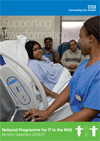 Throughout 2006/07 the NHS has introduced new computer systems and services to improve how information is stored and shared in the NHS. This new information technology (IT) provides opportunities for the health service to make changes and deliver better, safer care for patients. Supporting better, safer care is the main aim of the National Programme. The National Programme has a number of key projects. Each has its own purpose and contributes to the overall goal of linking a patient's health information together, helping those providing them with care.
Throughout 2006/07 the NHS has introduced new computer systems and services to improve how information is stored and shared in the NHS. This new information technology (IT) provides opportunities for the health service to make changes and deliver better, safer care for patients. Supporting better, safer care is the main aim of the National Programme. The National Programme has a number of key projects. Each has its own purpose and contributes to the overall goal of linking a patient's health information together, helping those providing them with care. Some projects, such as implementing a new broadband network for the NHS provide important foundations for other work. These projects were planned and delivered in the early part of the Programme. Others have longer timeframes.
Financial and efficiency savings will increase as more new computer systems and services begin to be installed in hospitals, GP practices and other care settings. This provides increased opportunities to support real transformation to improve the quality and safety of care for patients.
Download National Programme for IT in the NHS Benefits Statement 2006/07 Publication (.pdf, 1.224 KB)
Download from the eHealthNews.EU Portal's mirror: National Programme for IT in the NHS Benefits Statement 2006/07 Publication (.pdf, 1.224 KB)
Related news article:
NHS IT Programme Forecasts Better Care and a Billion in Savings